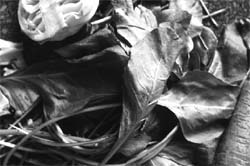Talking heads
 In the year 1991-92, 2,297 metric tonnes (mt) of pesticides in the rabi season and 903 mt in the kharif season are reported to have been used in Rajasthan, says Kabra. In 1998-99, the total pesticide usage during the kharif season was 879 mt, whereas the estimated target was 850 mt, according to the plant protection officer at Krishi Bhawan in Jaipur. In the rabi season, the usage was 2,585.6 mt, 85.6 mt in excess.
In the year 1991-92, 2,297 metric tonnes (mt) of pesticides in the rabi season and 903 mt in the kharif season are reported to have been used in Rajasthan, says Kabra. In 1998-99, the total pesticide usage during the kharif season was 879 mt, whereas the estimated target was 850 mt, according to the plant protection officer at Krishi Bhawan in Jaipur. In the rabi season, the usage was 2,585.6 mt, 85.6 mt in excess.
A report released by the Voluntary Health Association of India (VHAI) also documents the indiscriminate use and handling of highly neurotoxic pesticides in Rajasthan, besides the list of pesticides in use and their health effects (see table: Pest of a problem). But many experts believe that a more detailed study between pesticides and congenital defects is required to establish the link.
What medics say
Agreeing that the number of babies born with NTDs are on the rise, Jaipur-based paediatrician S K Gupta says this may due to improvements in health care facilities and, hence, better diagnosis. However, he calls for more research on the role of occupational and environmental exposures to determine the cause of these defects. Attention needs to be directed particularly to organic solvents, agricultural chemicals, including pesticides, water nitrates, heavy metals such as mercury, ionising radiation and water disinfection.
Agrees A K Wangnoo, senior consultant (endocrinologist and diabetologist) at the Apollo Hospital, New Delhi: "The exact causes of these defects are still unknown. There are geographical and seasonal differences in the incidence and association with occupational exposures suggesting that environmental factors such as pesticides are a possible link.' He emphasises that research and field data do suggest that a wide range of pesticides interfere with the normal functioning of the body's hormone system. "Hormones play a vital role in the proper development and healthy growth of the developing foetus. Hence, pre-natal diagnosis is very important and it is possible to screen mothers at great risk,' he adds.
In the rabi season, when the market is flooded with vegetables, the chances of poisoning may be more because green vegetables contain more pesticide residues, says J P Singh of vhai. "Pregnant women are prescribed more green vegetables. Thus, there might be a possible link between consumption of pesticide-laden vegetables and birth of children with severe neural defects,' he adds.
"We do around 7,000 sonographies a year. Any congenital disorder can be detected from the 13th week onwards. I think the birth of NTD babies can be related more to environmental pollution as a whole,' says P Periwala, consultant radiologist at Jaipur's SDM Hospital.
Veena Kalra of the All India Institute of Medical Sciences (AIIMS) points out a loophole in Kabra's study. "Kabra's report stating that the months of March and November are more frequently associated with birth defects should be checked with data of other years, too. Certain tables in the study that correlate month of conception and congenital anomalies does not support the stated hypothesis
Related Content
- Detox development: repurposing environmentally harmful subsidies
- Ethiopia to ease tensions with Egypt over Nile dam
- Climate talks head for final phase, India promises positivity
- Thousands march as UN climate talks head to crunch phase
- At stake for India in Paris climate talks
- Heads of state confirm Paris climate talks attendance: source
